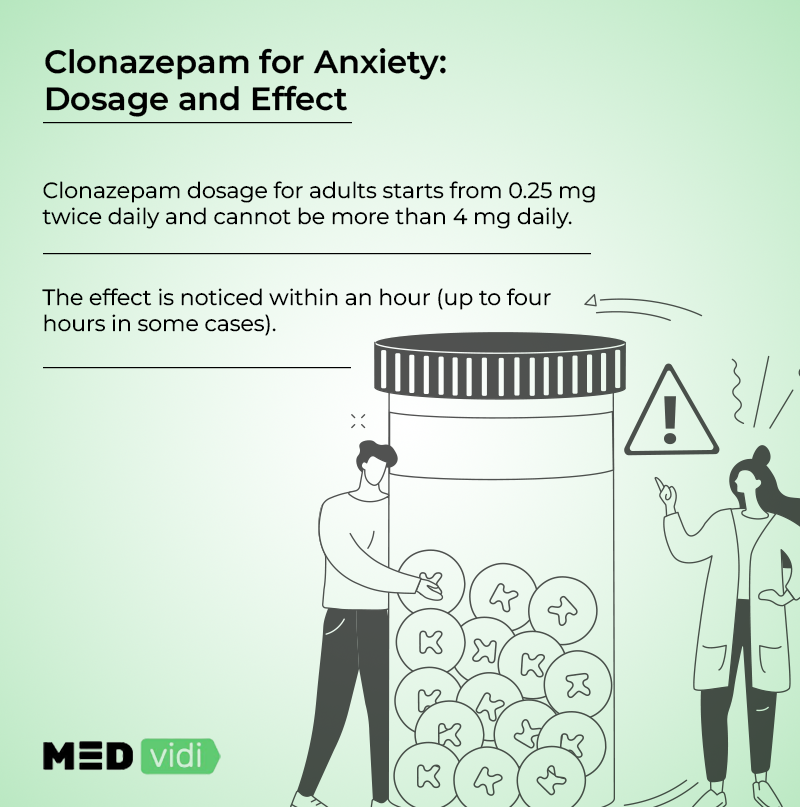Clonazepam is a benzodiazepine drug sold under the brand name Klonopin. Clonazepam for anxiety acts as a tranquilizer that produces sedative effects: it functions by calming down one’s mind and nerves.
This drug is a controlled substance, so a prescription is required to purchase it. It is available in tablets and syrup but it might not always be offered in every strength or form that the brand-name equivalent has. Also, as a generic medication, it typically costs less Klonopin.
However, these are not all the key aspects you should know about Clonazepam. Read out to learn what Klonopin is used for, its dosage, and its side effects.
Clonazepam Uses
Clonazepam is usually used to treat seizures and epileptic seizures or keep them under control. In such a case, it is referred to as an anticonvulsant or antiepileptic drug. Additionally, this medication is prescribed for the following conditions:
Is Klonopin Good for Anxiety?
Klonopin is
What Happens When You Take Clonazepam?
The exact Clonazepam’s mechanism of action is unclear. Still, experts have several opinions based on the effects of this drug and the causes of the conditions it treats.
Anxiety, mood problems, seizure disorders, and pain have all been connected to low GABA (gamma-aminobutyric acid) levels. This is because GABA is a neurotransmitter that blocks impulses between nerve cells in the brain.
As an anticonvulsant and a drug with sedative effects, Clonazepam operates on nerve cells to help calm abnormal electrical activity in the brain. So, according to experts, clonazepam keeps GABA at a high level in the central nervous system to impart its anticonvulsant, muscle relaxant, and anxiolytic actions. It does so by strengthening the affinity of the GABA-benzodiazepine receptor complex for GABA by strong binding.
Clonazepam Dosage for Anxiety
Klonopin dosage for anxiety will vary depending on the patient’s condition and symptoms. Only use Klonopin for anxiety as recommended by your doctor and also observe the label’s instructions.
Note: The following details are only the typical dosages of this medication. Unless your doctor instructs you to, do not alter your dose if it differs from the one disclosed below.
Adults | Starts from 0.25 mg twice daily. If necessary, the doctor might change the dose, not making it greater than 4 mg per day, though. |
Children | The safe dose of Clonazepam for a child is determined by the doctor. It usually starts with a low dose. |
Alternative Meds for Anxiety
Even though Clonazepam has a positive average rating and reviews from patients and doctors, your doctor may substitute it with other anxiety medications. It can be done if this drug isn’t helping you or isn’t a good fit for you for some other reasons.
The two replacements for Clonazepam are alprazolam (

Clonazepam Side Effects
Not all of these side effects are likely to occur, but if they do, medical treatment may be required.
Mild | Adverse | Severe |
|---|---|---|
|
|
|
Drug Interactions
When taking Clonazepam with additional substances or medications that may interact, the chance of serious side effects rises. If you are taking any of the following medications, let your doctor know.
- Opioids
- Pain relievers
- Alcohol
- Marijuana
- Sleep meds
- Muscle relaxants
- Antihistamines
Warning for Clonazepam
Since Clonazepam is a controlled substance, you should be aware of the following cautions before taking it:
- Black box warning. The Food and Drug Administration (FDA) has issued its most serious warning about Clonazepam. Doctors and patients are informed about potentially harmful drug side effects with a black box warning.
- Dependence. Even when taken as directed, Clonazepam use can result in physical dependence and withdrawal if stopped abruptly. Additionally, using this medicine might lead to abuse and addiction. Your risk of overdose and death increases if Clonazepam is misused.
- Use during pregnancy. According to the FDA medicine safety categories during pregnancy, Clonazepam is included in category D. When the mother uses the medication, there is a chance of negative consequences for the fetus. Only in extreme circumstances, such as when it’s required to treat a mother’s severe illness, can this medication be administered during pregnancy.
A Takeaway Message
Clonazepam for anxiety is one of the effective treatment options. However, people with anxiety symptoms should schedule a consultation with their doctor first to go over the range of available treatments and the advantages and disadvantages of each. Contact our health professionals at MEDvidi for the best anxiety treatment.













